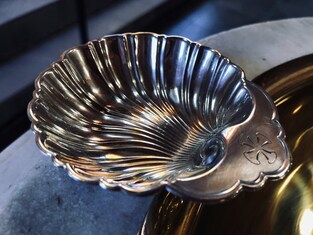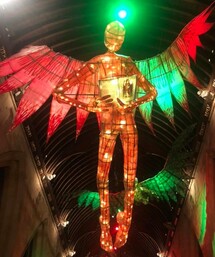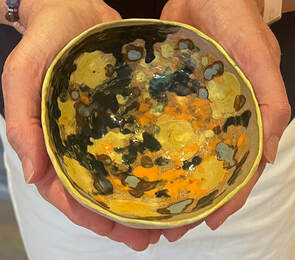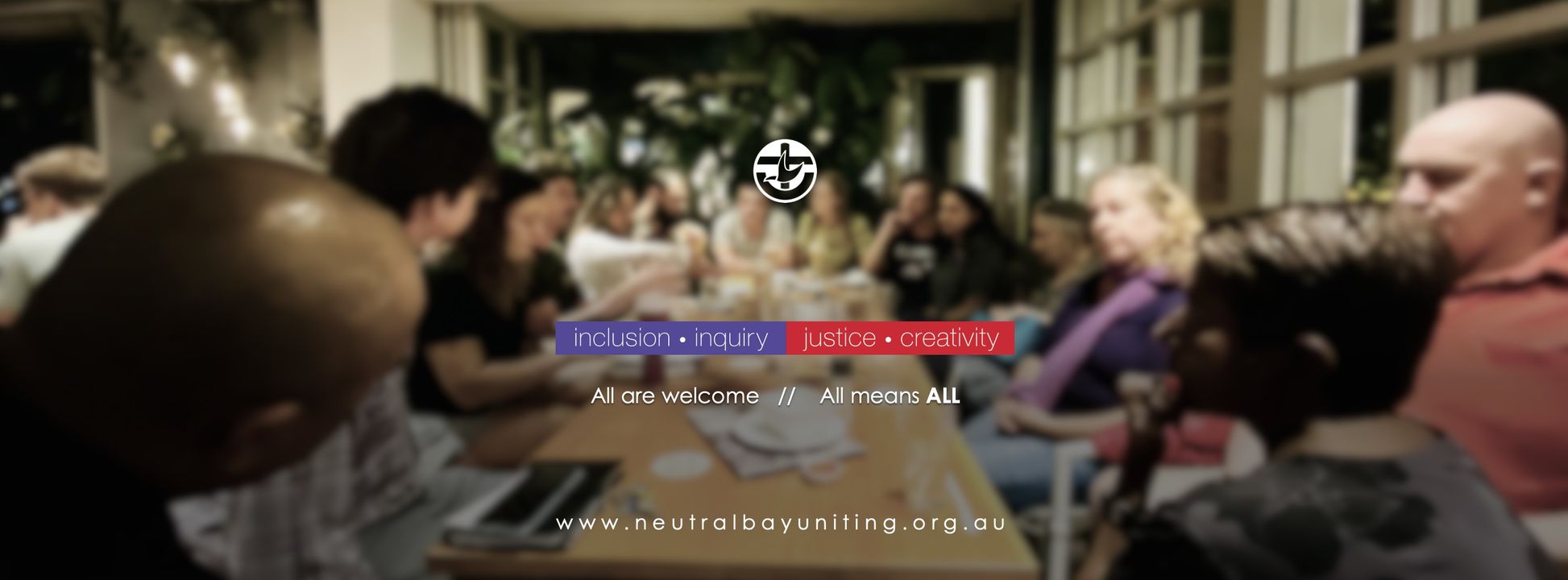 image: Brandy Martell, 400 block of 13th St near Frankland St, Oakland
image: Brandy Martell, 400 block of 13th St near Frankland St, Oakland
 image: Brandy Martell, 400 block of 13th St near Frankland St, Oakland image: Brandy Martell, 400 block of 13th St near Frankland St, Oakland ‘Tell all the truth', wrote the poet Emily Dickenson, 'but tell it slant’. For ‘The Truth must dazzle gradually/Or every one be blind.’[1] That is pretty much Mark’s Gospel’s account of resurrection, isn’t it? Whilst other resurrection stories were attached later, the two earliest, and arguably the best, manuscripts of Mark’s Gospel stop abruptly at verse 8 of chapter 16, with women fleeing from an empty tomb and ‘saying nothing to anyone, for they were afraid.’ Furthermore, the text simply stops in mid-sentence, with the little preposition which means ‘for’. Mark’s Gospel, at least, is clear that resurrection is both truly astounding and impossible to convey straightforwardly. For how do we describe resurrection? How do we communicate resurrection? How do we live resurrection? The nature of resurrection is that it involves strange truths of transformation: which require, like so much great art, ‘telling it slant’; which rest on mystery; and which revolve around deep, lived, experience. For art, mystery, and experience: these three things are at the heart of the strange truths of resurrection we exult in today, as witnessed to by our readings and key images this morning, and the continuing life of you and I, and all who follow Christ…
2 Comments
 scene from Sense8 scene from Sense8 Ecstasy – what does that word mean to you? Ecstasy certainly has many associations! Some of these are deeply sacred, others far more profane. Each however has something in common: they are about standing out: standing out of the ordinary. For in its Greek origins, ecstasy means exactly that. ‘Ek’ means ‘out of’ and ‘stasis’ means ‘standing: hence ‘ek-statis’ – standing out, or away from, the norm. Ecstasy certainly therefore has important philosophical and theological aspects. Take, for example, the queer Cuban American theorist José Esteban Muñoz. I have been thinking about Muñoz because the theme of this year’s Sydney Mardi Gras is ‘Our Future’ and Muñoz gave a great deal of creative thought to imagining more loving futures. For Muñoz suggested that, in contrast to what he called ‘straight time’, at their/our best, queer people live and invite others into what he called ‘ecstatic time’. In other words, instead of living with the ‘normal’ expectations of time and this world, at their/our best, queer people seek to live and reshape this world differently. Instead of our pasts, our presents, and our futures being shaped by our birth families, and by ‘straight’ drives’ for power, children, inheritance, and wealth, at their/our best, queer people seek different kinds of happiness and societal arrangements. For, like other historically marginalised people, queer people have typically been ‘ecstatic’ people. We/they have stood outside of ordinary life and time: which is very much where our two main figures in our biblical story tonight come in – Naomi and Ruth – as striking models of the ‘ecstatic community’ into which God calls us…  on wings of an eagle (image by David Clode on Unsplash) on wings of an eagle (image by David Clode on Unsplash) One ancient way of approaching spirituality, especially in the Orthodox Christian traditions, is to speak of three kinds of birdlife. The first of these, sometimes known as the ‘carnal’ life, is represented by farmyard chooks. These birds peck at the dust, clucking around, and sometimes fighting each other: confined to an enclosure, with their products used by others or being fattened up themselves for slaughter and consumption. The second, sometimes known as the ‘natural’ life, is represented by the rooster. This bird, with more intellectual capacity, is able to rise above, and see beyond, the farmyard dust; and, whilst remaining tied to it, is able to influence and manage aspects of the world of the chooks, at least to a degree. The third bird however is the eagle: who flies free, majestic, and far beyond, the limited horizons of both the chooks and the rooster. Not for nothing has the eagle thus been highly revered, across many cultural and faith traditions, not least among many First Nations peoples: being typically regarded as symbolic of great and deep strength, leadership, and vision. Now, there is of course the danger in such analogies of forms of spiritual elitism, a disregard of the ‘ordinary’, and disdain towards the material. Yet, as we hear Isaiah 40 verses 21-31 today, we are encouraged to be lifted up as ‘on eagle’s wings’. So to what kind of bird do we choose to look? What kind of life do we choose?...  image by Josh Eckstein on Unsplash image by Josh Eckstein on Unsplash Some of you may have noticed a change to our worship space today. The baby has gone – transformed it seems into a scallop shell. I am passing it around among you as I speak and I invite you to hold it for a few moments if you wish... ...Now, what strange alchemy is this, you may ask? What does this signify? We’ll come back to that. For now, just be aware that we are being subtly, and not so subtly, redirected, from the outer to the inner; from the seen to the unseen; from creation to re-creation; from the incarnation to the resurrection. This is a theological progression that demands that we go back to the beginning – to the creation of light in the story of Genesis as we heard, and to the beginning of the gospel as the author of Mark proclaims it just a couple of verses earlier than today’s text, ‘the beginning of the good news of Jesus Christ, the Son of God’...  image by Ehteshamul Haque Adit on Unsplash image by Ehteshamul Haque Adit on Unsplash Do you know the allegorical image known as 'The Vinegar Tasters'? It is related to Eastern philosophies and may be helpful to reflect upon as we end one calendar year and begin another, particularly as today’s Gospel reading offers us symbols brought to the Christ child from the East. For which gifts are we to offer at this time? What pathways are we seeking to tread into the future?...  image: by Elena Mozhvili on Unsplash image: by Elena Mozhvili on Unsplash ‘this is no time for a child to be born’ It would be very easy to echo those words; to feel that this is the ‘wrong’ time to rejoice in the birth of any child; the wrong time to rejoice at all. The world is burning and flooding; wars are raging and children are dying; famine is rampant and the political landscape as many of us have understood it for decades seems to be crumbling. The aftermath of the pandemic – and the threat of future pandemics – has left many people feeling tetchy, unsettled, grumpy and reluctant to trust. The message of the angel ‘do not be afraid’ seems to have a hollow ring – yet never has it been more important. ‘this is no time for a child to be born’ – yet it is the only time to be born and ‘Love still takes the risk of birth’ in spite of all our imperfection....  In essence, Christmas is quite a queer thing - don’t you think? I don’t really mean its added oddities, like the 19th century, mainly English, extras, like the carols we sing, and the 20th century, mainly American, extras, like the exaltation of Santa. Those are aspects of Christmas down under which are part of our eclectic multiculturalism, even if they partly reflect our settler colonial culture and tend to work better in the northern hemisphere. For we have more than a little work still to do in listening to the Spirit in these lands now called Australia, including turning many of Christmas traditional symbols upside down and inside out. But that is less of a challenge when we truly celebrate the queerness of Christmas, especially in its original, biblically recorded, forms. For the stories of Christ’s birth - God made flesh - are, like queerness, full of extraordinary features, and very difficult to pin down. Indeed, the very idea that God is made flesh was, and is, a horror to many people. That means that matter matters, and, not least, our bodies matter – and every little bit of them – and caring for one another and our planet matters, because ‘matter matters’ and everything shares in this divine matter. Meanwhile, the idea that God is born in, and with, marginal and outcast bodies still seems so absurd and objectionable to many. For the biblical stories and symbols present God’s queer love: the ultimately irresistible power of Love which overturns all the neat boxes and boundaries of our oppressive world, and its typical ways of thinking. So, rather than trying to straighten out Christmas, as many people try to do every year, I believe that we are far better simply to enjoy its very queer ride: which involves keep adding to the oddities of this time of year, with fresh joy and creativity; and letting its divine queerness shine in us…  I thought it might be helpful this morning to bring along a favourite bowl of mine. It was made by an artist friend Kerry Holland, whose paintings and bowl sculptures on the theme of The Visitation is currently on exhibition in Pitt Street Uniting Church. She also made this one, which she gave to me as a gift when I came out as transgender, affirming my authentic gender identity a few years ago. It is precious to me for that reason but also because, like all of Kerry’s bowl sculptures it is unique, with its own particular shape, story, and constellation of colours. In that sense, it is like each human being: an exquisitely unique and special divine creation. The more I reflect upon that, and upon the nature of a bowl itself, the more I am also drawn into the love of God. So I would like to share with you some ways in which each of us might helpfully use a bowl as a prayerful way into appreciating ourselves and others and holding together what can easily be misused in the Gospel parable (Matthew 25.31ff) which we heard read just now. For, whilst that passage is in some ways quite straightforward in the challenge it offers us, it is also presents some questions, particularly in the way it divides people into two black and white binary groups, one of which receives blessed things and the other total condemnation…  Some years ago, we had a lovely bishop on the New South Wales Central Coast who would occasionally run a workshop which he entitled ‘Don’t just do something, sit there!’ This was a deliberate response to our modern tendencies towards hyper-activity, including within Church circles. In the bishop’s case, he was hardly neglectful of social justice. He was, for example, very involved in the work of Samaritans (aka Anglicare in the Diocese of Newcastle), and a leading figure in Anglican environmental work. However, what he saw was that, without grace and space for God, even the best of our words and works are at risk of becoming easily frenzied and frustrated. Vitally, theologically, over activism also risks colluding with our world’s self-concerned drives for ever increasing productivity and consumption of various kinds – each of which can become godlike demands upon us. Particularly in Western Christianity, these also make use of ideas like the Protestant work ethic, which can easily reinforce the false idea that we essentially have value through what we do, rather than who we are, and that we are judged by what we achieve. No wonder our lives and world become so stressed, and it becomes so difficult to handle conflicts within, between, and beyond, ourselves. Just ‘being’ is so easily despised – whether this is through simply sitting, contemplation rather than action, space and silence rather than words and works. No wonder God, the source of being and becoming, also so easily disappears. Perhaps however, as the bishop suggested, these may actually be ways back to balance, including helping heal great conflicts. Understood in this way, our Gospel parable today (Matthew 25.14-30) calls us to consider burying our talents, our time and our treasure, as means of divine resistance and renewal…  Alex may, or may not, remember the first time we met. It was at the start of a new year in which, finally, I was resolved to affirm my gender identity publicly. Dressed as a female, that Sunday I consequently chose MCC at Petersham as the safest space in Sydney to go to Church – Pitt Street Uniting Church would also have been fine but I already knew too many people there and that would have caused premature attention elsewhere. The MCC worship was uplifting and the community immensely welcoming. Over coffee, I then remember a gorgeous young man speaking beautifully and articulately, passionately and gently, about faith, life, and the possibilities of joy and community for us all, whoever we are. He opened us up to the experiences he was having in his studies in the USA, and some of the wonderful new life of progressive churches there. That young man was Alex, and, little did we know it, but our lives were to intersect frequently in the following years. Not least, after I came out publicly, MCC Brisbane was my second spiritual home, alongside the terrific Milton Anglican community. As Pastor there, Alex helped accompany me through that stage of life, enriching Penny and I, as well as so many others, with his gifts and love. Hopefully, we too offered some mutual support. Indeed, just as Penny and I were honoured to share in Alex’s ordination at MCC, and to walk with him through that time, so the last thing we experienced in Brisbane was a blessing from MCC for our journey into new ministry at Pitt Street Uniting Church, conducted by Alex. It has therefore been such a joy to be reunited with Alex here in Sydney, sharing not only times of struggle – such as the queerphobic attacks upon Pitt Street and the wider LGBTIQA+ community earlier this year, but new steps, such as that for which we gather today. All this too, is part of the shared inspiration which Penny and I, like Alex, draw from the extraordinary text of the book of Ruth which we have just heard… |
Authors
sermons and reflections from Penny Jones & Josephine Inkpin, a same gender married Anglican clergy couple serving with the Uniting Church in Sydney Archives
June 2024
Categories
All
|
 RSS Feed
RSS Feed